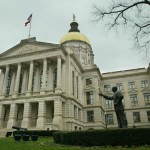The 2010 Georgia General Assembly, which wrapped up in late April, was the longest session that anyone can remember. During the session Georgia Watch monitored and spoke out on a number of different bills affecting consumers, including legislation on civil justice, ethics, flood plain notifications, lending, nonprofit hospitals, and utilities, to name a few.
Below we highlight several key bills that Georgia Watch worked on in 2010.
PSC Expert Compensation (HB 1233)
To save money in a shrinking state budget, this year the legislature cut funding for expert testimony at the Public Service Commission (PSC). Experts are hired by PSC staff to testify on proposed rate increases to power and gas bills.
In order to ensure that experts would still be available, Rep John Lunsford (R-McDonough) introduced HB 1233, which would require utilities to pay for the experts that the PSC staff selects. The utilities could then bill their customers for the same amount, which would add up to a few pennies a year.
However, one type of expert was specifically left out of the bill. Rate design experts, who offer opinions on how to allocate rates across different classes of customers, were left out of the new compensation scheme at the request of a manufacturing association, which often tries to cut deals with utilities to shift the burden of cost increases onto families and small businesses.
Georgia Watch objected, and had the bill amended in committee to ensure that all experts would have a sustainable source of funding.
The bill passed and has been signed by the governor.
Mortgage Reform (SB 57)
Since fall 2008, Georgia has had more bank failures than any other state in the nation. Our state ranks consistently in the top ten for foreclosures, and between one-third and one-half of all mortgages in Georgia are underwater, meaning the borrower owes more on their loan than the home is worth.
Although legislators were well aware of these symptoms in Georgia’s home lending market, they did nothing to address the problems. For the second year in a row, legislators let SB 57 die in the House Rules Committee. This bill, sponsored by Sen. Bill Hamrick (R-Carrollton), would have put safeguards in place to protect borrowers, investors, and communities from foreclosure and the riskiest of loans.
Most of the protections in the bill would have applied to subprime loans only, which have gone into default in large numbers, leading to a foreclosure crisis and an overall economic slide across the country. Measures such as banning mortgage broker kickbacks, prohibiting prepayment penalties, and requiring that a lender verify that a borrower has the ability to repay a subprime loan would be a narrow approach to solving a big problem.
These ideas were massaged for weeks in the House Judiciary Committee, and eventually weakened before moving on to the Rules Committee. However, the bill never moved out of Rules and onto the floor. The sponsor, Sen. Hamrick, never even asked for a floor vote.
Comprehensive Telecom Reform (HB 168)
HB 168 makes comprehensive changes to fee structures between telephone companies and the Universal Access Fund. This year, when the bill got over to the Senate, a provision was added to take away the authority of the PSC to handle consumer complaints related to phone service. This authority led to the PSC refunding $145,000 to aggrieved customers in 2009.
Georgia Watch went public with opposition to the provision, and Governor Perdue threatened to veto any bill that took away the PSC’s authority over phone service complaints. The authority was restored in the final version of HB 168, which passed and was signed by the governor.

